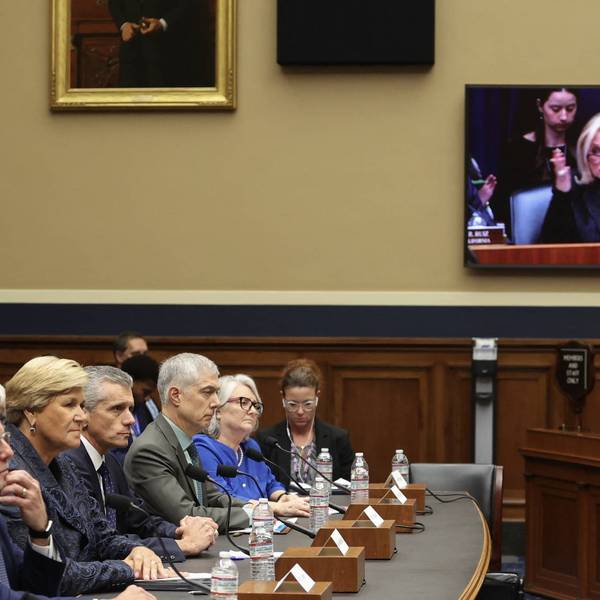Bruised in heated town halls in Florida, Tennessee, Georgia and elsewhere, the right wing in Congress now realizes it could pay a steep political price for throwing tens of millions of people off their health care, destabilizing our health care system, and putting people at risk of death.
"I'm fighting Congress for my life," Virginian Matt Skeens, a grassroots leader with Virginia Organizing, told local media and NBC Nightly News during a protest on February 9. Skeens has twice survived cancer and was able to have a brain tumor removed thanks to his coverage under the Affordable Care Act (ACA).
"The changes they want are massive: slashing public investment in health care by trillions of dollars, handing the rich a tax cut, and moving the country further away from establishing health care as a public good."
Protesters like Skeens have thrown a wrench in Republican plans to quickly repeal the ACA.
But the right wing still has its heart set on eviscerating the health care programs that families across the United States have come to count on - not only the ACA but also Medicaid and Medicare, which have provided coverage since 1965.
The changes they want are massive: slashing public investment in health care by trillions of dollars, handing the rich a tax cut, and moving the country further away from establishing health care as a public good.
To accomplish this plan, the right wing is burying their true goals under policy buzzwords and misleading claims, while misrepresenting the ACA and Medicaid in slippery language and flat-out lies.
We got a taste of that during a televised town hall debate on CNN between Sen. Bernie Sanders (I-Vt.) and Sen. Ted Cruz (R-Texas). Cruz told a breast cancer survivor that all significant Republican plans "protect people in [her] situation," meaning people with preexisting conditions. But get beyond the rhetoric and you will find that people with preexisting conditions face significant risks under the Republican plans.
The week of February 19, during what's being called "Resistance Recess," you are urged to go to a town hall meeting or a rally to call out members of Congress who are hiding behind falsehoods and propaganda. Use this link to find a Resistance Recess event in your area, or create an event of your own.
Inoculate Yourself
When you are at an event or meeting with your member of Congress, protect yourself against the misinformation with this decoder for Republican policy buzz phrases.
1. "Block grant for Medicaid"
What it is: Waiting lists and stripped-down coverage.
Right now anyone who is eligible for Medicaid anywhere in the country can enroll and get care. Turning that program into a fixed block grant that states are left to manage ends that guarantee. There will be cuts of $1 trillion to a program covering almost one quarter of the country. The result: anything from waiting lists to stripped-down coverage. Less care for everyone from children to nursing home residents.
2. "Health savings accounts"
What it is: High deductibles for us, tax shelters for the rich.
This favorite conservative trope -- that struggling families should somehow squirrel away enough money to deal with health care expenses -- really means a tax shelter for the rich and a rip-off for everyone else. These accounts are tied to high-deductible insurance plans with minimum deductibles of $2,600 for family coverage. Deductibles could be as high as $10,000 or even $20,000. They are a big source of profiteering for insurance corporations. Even people enrolled in them don't recommend them.
3. "High-risk pools"
What it is: Premiums above $1,000 a month.
High-risk pools are segregated insurance for people with preexisting conditions. They've been tried in 35 states and have failed. Premiums in these pools run upwards of $1,000 a month. There's been a history of premiums hitting $20,000 a year or more, and deductibles have been as high as to $25,000. And imagine needing medical treatments costing hundreds of thousands of dollars, while stuck with a high-risk policy with a lifetime cap as low as $75,000.
4. "Per-capita caps for Medicaid"
What it is: Arbitrary limits on your health care.
This is the sibling of the Medicaid block grant. What it means is politicians impose an arbitrary limit on your health care. It means no more guarantee that Medicaid will pay for as much covered care as you need. It could mean high deductibles, high premiums, elimination of benefits like prescription drugs or maternity care, and more.
5. "Medicare privatization" or "premium support"
What it is: Throwing seniors to insurance corporations.
A key goal of House Speaker Paul Ryan and Secretary of Health and Human Services Tom Price, the man picked by Donald Trump to oversee health policy, this would turn the popular Medicare program over to insurance corporations. Instead of guaranteed coverage, you will get a voucher you would use to shop for private insurance. There is no guarantee the voucher would be enough for the same level coverage -- or any coverage at all. The bottom line: worse coverage at a higher price. And this from the same people who want to reduce regulations on insurance companies as seniors are being placed at their mercy.
Slippery Language and Broken Promises
Then, of course, there's the broken-promise lie. Donald Trump insisted he'd allow Medicare to negotiate for lower drug prices. But he recently turned his back on that promise after meeting with drug corporation lobbyists. His new Secretary of Health and Human Services, Tom Price, is a drug corporation insider, so the backtracking is no surprise.
But the right-wingers still feel compelled to pretend they've got the concerns of people, not corporations, in mind. Equipped with the real meaning behind their buzzwords and slippery language, we can show where their true interests lie.



